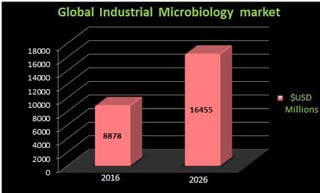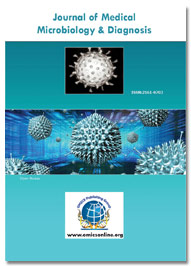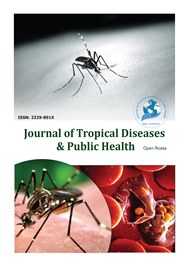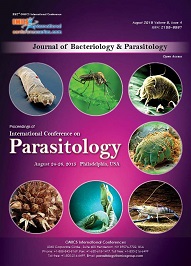Theme: Addressing new challenges and emerging issues in Parasitology
Parasitology 2020
Parasitology is simply the study of parasites, their hosts, and the relationship between them. Infectious diseases are caused by organisms — such as bacteria, viruses, fungi or parasites where Microbiology is the study of these microscopic organisms. Many millions of organisms live in and on our bodies but under certain conditions, some organisms may cause disease these can be transmitted from one to one. Microbiology also includes fundamental research in the field of many branches like cell biology, physiology, biochemistry, evolution, ecology and clinical aspects of microorganisms, including how the host responds to these agents.
Parasitology-2020 invites all the participants from all over the world to attend '7th International Conference on Parasitology, Microbiology & Infection Control' during November 16-17, 2020 in Lisbon, Portugal which includes prompt keynote presentations, Oral talks, Poster presentations and Exhibitions.
Parasitology-2020 is to gathering people in academia and society interested in parasitology to share the latest trends and important issues relevant to our field/subject area. The scientific programme of the conference is broad and embraces different research aspects with focus on applied and ecological parasitology, and in particular with a veterinary and medical interest. The conference will include invited speakers, oral presentations, poster session and the young scientist award. Parasitology 2020 organizes a conferences of 1000+ Global Events inclusive of 300+ Conferences, 500+ Upcoming and Previous Symposiums and Workshops in USA, Europe & Asia with support from 1000 more scientific societies and publish 700+ Open access journals which contains over 30000 eminent personalities, reputed scientists as editorial board members.
Why to attend??
With members from around the world focused on learning about parasitology and its advances; this is your best opportunity to reach the largest assemblage of participants from the parasitology community. Conduct presentations, distribute information, meet with current and potential scientists, make a splash with new drug developments, and receive name recognition at this 2-day event. World-renowned speakers, the most recent techniques, developments, and the newest updates in Parasitology are hallmarks of this conference.
Target Audience:
- Parasitology Students, Scientists
- Parasitology Researchers
- Parasitology Faculty
- Medical Colleges
- Parasitology Associations and Societies
- Business Entrepreneurs
- Training Institutes
- Manufacturing Medical Devices Companies
- Microbiology Researchers
- Veterinary Students, scientists
- Microbiology Associations and Societies
Parasitology 2020 is to gathering people in academia and society interested in parasitology to share the latest trends and important issues relevant to our field/subject area. The scientific program of the conference is broad and embraces different research aspects with focus on applied and ecological Parasitology, and in particular with a veterinary and medical interest. The conference will include invited speakers, oral presentations, poster session and the young scientist award.
Sessions
Track 1: Basic parasitology
Parasitology is the study of relationship between parasite and the host. It is the common discipline, dimensions are not determined by the organism but can be known by their way of living which implies parasitology frames a blend of different branches and gets more methods from different fields like Bioinformatics, Biochemistry, Cell biology, Genetics, Evolution and biology.
2nd International Conference on Medical and Molecular Pathology-February 12-13, 2020 | Paris, France; 2nd International Conference on Breast Pathology and Cancer Diagnosis-September 17-18, 2020 | Vienna, Austria; Annual meeting on Infectious Diseases, Microbiology & Beneficial Microbes-May 13-14, 2020 | Zagreb, Croatia; 7th International Conference on Infectious Diseases, Bacteriology and Antibiotics-October 12-13, 2020 | Prague, Czech Republic; 18th European Pathology and Medicine Congress-April 29-30, 2020 | Prague, Czech Republic;
Track 2: Animal Association
Animal Association or symbiosis means close and prolonged relation between two or more organisms of species with or without mutual benefit or harm. It’s of 4 types mainly mutualism, commensalism, parasitism, phoresis. In Phoresis, the dependency between the phorantn (parasite) and phorant (host) is not seen or absent. In commensalism one is benefited and other is neither benefited nor harmed. In parasitism one depends on other which is usually a parasite. In mutualism, both the organisms (host, parasite) are benefited parallelly.
Track 3: Parasitic Hosts
Parasitism is the relationship between a parasite and host. The relation may be reciprocal or commensality where the host provides nutrition and shelter for the parasite. Even though parasites harm their hosts, it is in the parasite interest not to kill the host because the parasite rests on the body of host. A few known parasites are tapeworms, fleas, barnacles.
Track 4: Therapeutic Parasitology
Remedial parasitology encases the investigation of 3 noteworthy sorts of living beings like parasitic protozoa, parasitic helminths (worms) and individual’s arthropods that reason disorder or go about as vectors of differed pathogens.
Track 5: Protozoology
It is defined as the study of protozoa a unicellular organism in detail about the infections caused by them. Life cycles, morphological choices, host parasite communications, land circulation, reservoir host and administration of general medical problems or clinical apply including medicinally crucial protozoa. Strategies for transmission and organization, pathology, immunologic points and task will be secured. The common and clinical points of view got in the midst of this course can help understudies inside the affirmation, examination and organization of general therapeutic issues or clinical apply including therapeutically critical protozoa.
Track 6: Helminthology
A branch of Zoology that deals with the parasitic worms (helminths) and the disease caused by them is known as helminthiases in animals, plants and human being. Helminthology is nearly related in the meantime with numerous other natural sciences (primarily zoology), drug, veterinary science, and plant pathology. Here are some branches like general helminthology (examination of the fauna, morphology, logical classification, regular cycles, and physiology of parasitic worms) therapeutic helminthology (human helminthiases and methodologies for controlling them) veterinary helminthology and agronomical or plant helminthology (analysing the effects of helminths on plants and procedures for controlling helminthiases in them).
Track 7: Experimental Parasitology
Test parasitology put weight on show time ways to deal with parasitology and furthermore joins different branches like sub-atomic science, immunology. The examination centers around physiology, metabolic, immunological, biochemical, nutritious, chemotherapeutic parts of parasites and furthermore the connection between have parasite.
Track 8: Arthropod Parasite
Arthropods shape a colossal gathering of little coelomate creatures with "jointed appendages" (consequently the name arthro-cases). They show division of their bodies (metamerism) which is frequently veiled in grown-ups on the grounds that their 10-25 body portions are joined into 2-3 useful gatherings (called tagmata). Arthropods have an inflexible cuticular exoskeleton comprising for the most part of tanned proteins and chitin. The exoskeleton gives physical and physiological assurance and fills in as a place for muscle connection attachments.
Track 9: Anatomical Parasitology
Anatomical parasitology is the branch deals with the study of structures of parasitic proteins. Among protozoan parasites, the phylum Apicomplexa includes organisms liable for protozoa infection, contamination and cryptosporidiosis. Trypanosome and genus leishmaniasis, the phylum of kinetoplastida cause ailment, African sleeping disease and Assam fever. For several those sicknesses, like protozoa malady, existing prescription defy the peril of insurance. For others, as cryptosporidiosis, there's no intense treatment.
Track 10: Veterinary Parasitology:
The investigation of parasites that reason economic misfortunes in horticulture or aquaculture tasks or which taint buddy creatures cases of species contemplated are: Otodectes cynotis, the feline ear mite responsible for canker. This branch essentially manages the helminthology, Protozoology and entomology. Veterinary Parasitologists examine the lifecycles of the parasites in their particular host. The data gathered is useful to secure creatures and enhance their wellbeing so this veterinary parasitology is boot fundamental for general wellbeing.
Track 11: Transmission of parasitic infection
The parasitic infections are mainly transmitted by the animals. These can be caused by viruses, fungi, bacteria, parasites. Parasitic diseases affect all living organisms as well as plants and animals. Common routes of transmission are by food or water (Roundworm, Amoeba, and Giardia) and also by vectors like mosquito, flea, housefly, sand fly, and sexual contact, Inhalation of contaminated dirt or air, skin penetration.
Track 12: Immunoparasitology
This topic mainly focuses on latest developments in Immunoparasitology, which incorporates the immunological interactions between the host and the parasite including immune responses to parasitic infections and manipulates the host immune system by parasites and their products. The incidence of parasitic diseases like malaria, schistosomiasis have been increased rather in recent years. Parasites are called as skilled evaders of host immunity because they complete their lifecycle a part or all in the host causing infections to them.
Track 13: Tested Parasitology
The impacts of parasitic worms on the framework square measure an as of late rising theme of concentrate among immunologists and distinctive researcher. Trials concerned a decent fluctuate of parasites, sicknesses and hosts. The outcomes on people are of intrigue bunch for the scientists. The inclination of the numerous parasitic worms to conciliate the host's response grants them to pacify a few sicknesses though some declining others. Broad examination demonstrates that parasitic worms have the adaptability to deactivate bound framework cells, bringing about a gentler response.
Track 14: Equatorial Parasitology
This intelligent session covers a few contaminations and invasions that are delegated "tropical illnesses" acclimated be endemic in nations arranged inside the tropics. This consolidates broad diseases like wilderness fever; viral haemorrhagic fever and hookworm pollutions moreover as passing remarkable contaminations like lagochilascaris minor. A couple of those afflictions are controlled or perhaps shed from made countries, as results of enhancements in cabin, eating schedule, sanitation, and private neatness.
Track 15: Scientific Manifestations of Parasitic Diseases
Parasites square measure single cell little estimated smaller scale creatures that live to tell the story elective living things together with creatures and people to initiate nourishment and survive. For the most part people will endure serious perilous diseases once they have a parasitic assault. Parasitic infections caused principally by Protozoa and Helminths. Parasites square proportion of 2 assortments Ecto parasites and endo parasites. In the event that any parasite lives on the surface of a bundle like human it's alluded to as epizoic and parasite lives inside the physical protest it's alluded to as entozoan. The normal parasitic ailments square measure irresistible illness, Pneumonia, Filariasis, Scabies, and lousiness and so forth.
Track 16: Cataloging of Parasites:
At that point lab distinguishing proof includes run of the mill ways like optical research utilized for the morphological ID. Science strategies region unit won't analyse parasite structures, distinguishing proof and portrayal of parasites. The objective of the present examination was to audit the most present and new analytic systems for Identification of parasite contaminations.
E.g.: Enzyme chain response (PCR), circle intervened measure up to enhancement (LAMP), Luminex xMAP, period catalyst chain response (RT-PCR), irregular increased polymorphic polymer (RAPD), and section length polymorphism (RFLP), Molecular examines have exhaustively supported inside the recognizable proof treatment and epidemiologic investigations of parasitic ailments.
Track 17: Epidemiology of Bacterial Infections:
Therapeutic zoology, or general wellbeing zoology, and conjointly veterinary zoology are focused upon creepy crawlies and arthropods that effect human wellbeing. Veterinary zoology is encased amid this class, because of a few creature maladies will "hop species" and turn into a man's wellbeing risk, for instance, cow-like cephalitis. Therapeutic zoology conjointly incorporates investigate on the conduct, biology, and restorative forte of invertebrate disorder vectors, and includes an extraordinary stretch to the overall population, together with local and state officers and distinctive partners inside the enthusiasm of open security, at last in ebb and flow situation related with one wellbeing approach to a great extent wellbeing strategy producers prescribes to wide significance of medicinal zoology for affliction administration practical and best work on accomplishing improvement objective and to handle the new growing creature sickness illnesses.
Track 18: Nourishment and Biochemistry of Parasites:
Parasitic sustenance could be a method of heterotrophic nourishment where a life form lives on the body surface or inside the body of another assortment of life form. This needy cooperation is usually hurtful to the host. Parasites require supplements for the development and capacities from the host zone unit. As result, parasites have sizeable adjustments to enhance nourishment and their survival. Carbohydrates are utilized to think of vitality, amino acids and unsaturated fats are worried inside the combination of macromolecules and furthermore the generation of eggs. For the most part parasites are heterotrophs, they can't orchestrate their own 'sustenance'.
Track 19: Recombinant DNA Technology on Parasitology
Recombinant DNA innovation has significant effect on our comprehension of numerous life forms and organic procedures in the course of recent decades. Cloned correlative DNA duplicates of mRNAs are anything but difficult to articulation of individual quality items in different life forms. The compound chain reaction has fantastically extended the limit of DNA by offered reward to the area of insignificantly in demonstrate molecule. The isolation of protozoa malady matter by explanation screening deoxyribonucleic destructive, are wide utilized in the fields of parasitology.
The confinement of intestinal sickness antigen by articulation screening cDNA, have been broadly utilized in the fields of parasitology such as Molecular hereditary qualities, Hemoglobinopathies, Vaccine readiness, Diagnosis and also treatment of human malady.
Track 20: Analysis and Limitation of Parasitic Disease
The organization of parasitic sicknesses of individuals has been endeavored since the reason and history of the defilements was seen. Some parasitic defilement like protozoa infection has endeavoured outrageous to oversee. Worm diseases are adequately controlled. They are very surprising ways to deal with manage from assignment to treatment of parasitic sicknesses. The transmission by preventative therapy and vector controls the incontrovertible fact of many parasitic diseases are by contaminated provides ensuing from inadequate waste disposal.
Track 21: Vector Borne Diseases
Vectors are living life forms that can transmit irresistible maladies between people or from creatures to people. These diseases are infections transmitted by the bite of infected arthropod species, such as mosquitoes, ticks, triatomine bugs, sand flies and blackflies. Some examples to these kinds of diseases are malaria, dengue fever, Yellow fever and plague. Arthropod vectors are cold-blooded and are sensitive to climatic factors which influences on survival and reproduction rate of vectors. Vector-borne diseases are widespread in Europe and are the best studied diseases associated with climatic change.
Track 22: Molecular Biology and Immune Evasion
This session concerned with the recent approaches of Molecular biology, a branch that deals with the composition, structure and interactions of cellular molecules like nucleic acids, proteins that carry out the biological processes needed for cell laitance and growth, whereas immune evasion is a the process by which parasites evade hosts immune system to maximize their chance of being transmitted to a fresh host or to continue growing respectively.
Track 23: Ticks and Tick Borne Diseases
Ticks are small arachnids, ectoparasites living by feeding on the blood of mammals, birds, and sometimes reptiles and amphibians. Tick-borne diseases, which afflict humans and animals, are caused by infectious agents transmitted by tick bites. Tick-borne ailments are caused by contamination with an assortment of pathogens, including rickettsia and different sorts of bacteria, viruses, and protozoa since singular ticks can harbor in excess of one ailment causing agent, patients can be tainted with in excess of one pathogen at the same time, compounding the trouble in analysis and treatment.
Track 24: Marine Parasites and Exposure to Public Health
Fish parasites are important biological indicators to describe migration patterns of fish stocks, trophic and phylogenetic interactions as well as pollution and eutrophication. Marine parasitology is an important field in aquatic science because of its close linkage to other fields in marine sciences like fisheries, Mari culture, fish ecology, environmental monitoring.
Track 25: Remunerative for Parasite Diseases
Parasitic ailments trouble gigantic amounts of individuals, UN association quantifiable that no world scale, overpowering and parasitic illnesses were chargeable for passings. Protozoa tainting bringing about most passing’s 225 million clinical cases of protozoa sickness and these came to fruition around 781,000 passing. The dominant part of those cases occurred in kids more young than 5 years in Africa. In 2000, there have been quantifiable to be 233 million clinical cases that achieved close to 985,000 passings.
Track 26: Approaches to Control Parasitic Diseases
The control of parasitic infections of humans has undertaken since aetiology and natural history of the infections was recognized and the deleterious effects on human health. However, some parasitic infections such as malaria proved difficult to control. The approaches to control are to cure and treat clinically sick patient, to control the transmission within the community by preventative chemotherapy and vector control are outlined.
On-going advancements in new analytic devices, in any case, have opened new roads for an enormous change in parasite discovery. Initially, assortment of more up to date serology-based tests that territory unit to a great degree particular and delicate have developed, similar to the Falcon test screening check examine (FAST-ELISA) , Dot-ELISA , quick issue location framework (RDTS) , and luciferase resistant precipitation framework (LIPS) .
Also, atomic based methodologies like circle interceded rise to enhancement (LAMP), timeframe catalyst chain response, and Luminex have demonstrated a high potential to be utilized in parasite assignment with amplified specificity and affectability. Thirdly, proteomic innovation has conjointly been presented for the development of biomarkers abuse tissues or natural liquids from the tainted host.
Track 27: Health Policy Environment
Environmental health policy is the interaction between environment and health, and how the environment can affect human health. There are several factors that can damage health including air quality, climate change, toxic drinking water and toxic chemical exposure. Some common effects on health include asthma, malaria, cholera, disease, cancer and physical injury. It is estimated that the increasing temperatures over the past 30 years have resulted in the deaths of 150,000 lives each year. Social orders round the world might want pioneers United Nations organization region unit conversant in each natural wellbeing sciences and in arrangement investigation. The Environmental Health Policy Certificate intends to give such pioneers. This blend gives abilities required in natural wellbeing science and approach at the local, national, and universal levels.
Parasitology and its Importance:
Parasitology is the investigation of the connection amongst parasites and their hosts. A parasite causes critical maladies of human. Parasitology generally has fused the examination of three important social events of animals: parasitic protozoa, parasitic helminths (worms), and those arthropods that direct reason disease or go about as vectors of various pathogens. A parasite is a pathogen that at the same time hurts and gets sustenance from its host. A few life forms called parasites are really commensals, in that they neither advantage nor hurt their host (for instance, Entamoeba coli). In spite of the fact that parasitology had its starting points in the zoologic sciences, it is today an interdisciplinary field, significantly affected by Microbiology, immunology, natural chemistry, and other life sciences. Microbiology is the investigation of every living being that are too little to be in any way unmistakable with the bare eye. This incorporates microorganisms, Archaea, infections, parasites, prions, protozoa and green growth, altogether known as 'Organisms'. These organisms assume enter parts in supplement cycling, biodegradation/bio-deterioration, environmental change, sustenance decay, the reason and control of sickness, and Biotechnology, creatures and even plants.
Parasitology Market Share Insights:
The market is a little while later told by a few key people, for example, bio-Merieux S.A., Cepheid Inc., Danaher Corporation; and Bruker Corporation Different prominent players working in the market consolidate anyway are not obliged to Becton Dickinson and Company, Hologic Inc., Roche Diagnostics, and Alere Inc. Introduction of automated systems and inventive plans is required to elevate the restriction by changing business area components over the guess time period.
Why Lisbon, Portugal?
Lisbon is the capital and most crowded district of the Portugal. Its status as the capital is ordered by the Constitution of the Portugal, although it isn't the seat of the administration, which is The Hague. Lisbon has a populace of 851,373 inside the city appropriate, 1,351,587 in the urban territory, and 2,410,960 in the Lisbon metropolitan area. Lisbon is viewed as an alpha world city by the Globalization and World Cities (GaWC) think about gathering. The city is additionally the social capital of the Portugal. Many substantial Dutch foundations have their central station there, and seven of the world's 500 biggest organizations, including Philips, AkzoNobel, Tom-tom and ING, are situated in the city. Likewise, many driving innovation organizations have their European base camp in Lisbon, for example, Uber, Netflix and Tesla.
Market Growth:
The overall Microbiology promote measure was regarded at USD 9.1 billion of each 2016 and is depended upon to make at a CAGR of 6.7% over the check time period. Continually rising event of overwhelming diseases is driving business segment growth. In 2013, the microbiology testing market spoke to 5% in the overall IVD publicize and contributed $3556.7 million out of 2013 to the IVD exhibit, and is surveyed to reach $4737.2 million by 2018, at a CAGR of 6.2% from 2013 to 2018.Irresistible ailments are fundamentally analysed utilizing clinical tests. As demonstrated by the Centers for Disease Control and Prevention (CDC), around 9,421 new cases of tuberculosis, 51,455 new cases of salmonella, 33,461 new cases of Lyme illness, and 433 new cases of meningococcal ailment were enrolled in U.S. in 2014.

Conference Highlights
- Basic Parasitology
- Animal Association
- Parasitic Hosts
- Therapeutic Parasitology
- Protozoology
- Helminthology
- Experimental Parasitology
- Arthropod Parasite
- Anatomical Parasitology
- Veterinary Parasitology
- Transmission of Parasitic Infection
- Immunoparasitology
- Tested Parasitology
- Equatorial Parasitology
- Scientific Manifestations of Parasitic Diseases
- Cataloging of Parasites
- Epidemiology of Bacterial Infections
- Nourishment and Biochemistry of Parasites
- Recombinant DNA Technology on Parasitology
- Analysis and Limitation of Parasitic Disease
- Vector Borne Diseases
- Molecular Biology and Immune Evasion
- Ticks and Tick Borne Diseases
- Marine Parasites and Exposure to Public Health
- Remunerative for Parasite Diseases
- Approaches to Control Parasitic Diseases
- Health Policy Environment
To share your views and research, please click here to register for the Conference.
To Collaborate Scientific Professionals around the World
| Conference Date | November 08-09, 2020 | ||
| Sponsors & Exhibitors |
|
||
| Speaker Opportunity Closed | |||
| Poster Opportunity Closed | Click Here to View | ||
Useful Links
Special Issues
All accepted abstracts will be published in respective Our International Journals.
- Journal of Medical Microbiology & Diagnosis
- Journal of Infectious Diseases and Treatment
- International Journal of HIV and AIDS research
Abstracts will be provided with Digital Object Identifier by















